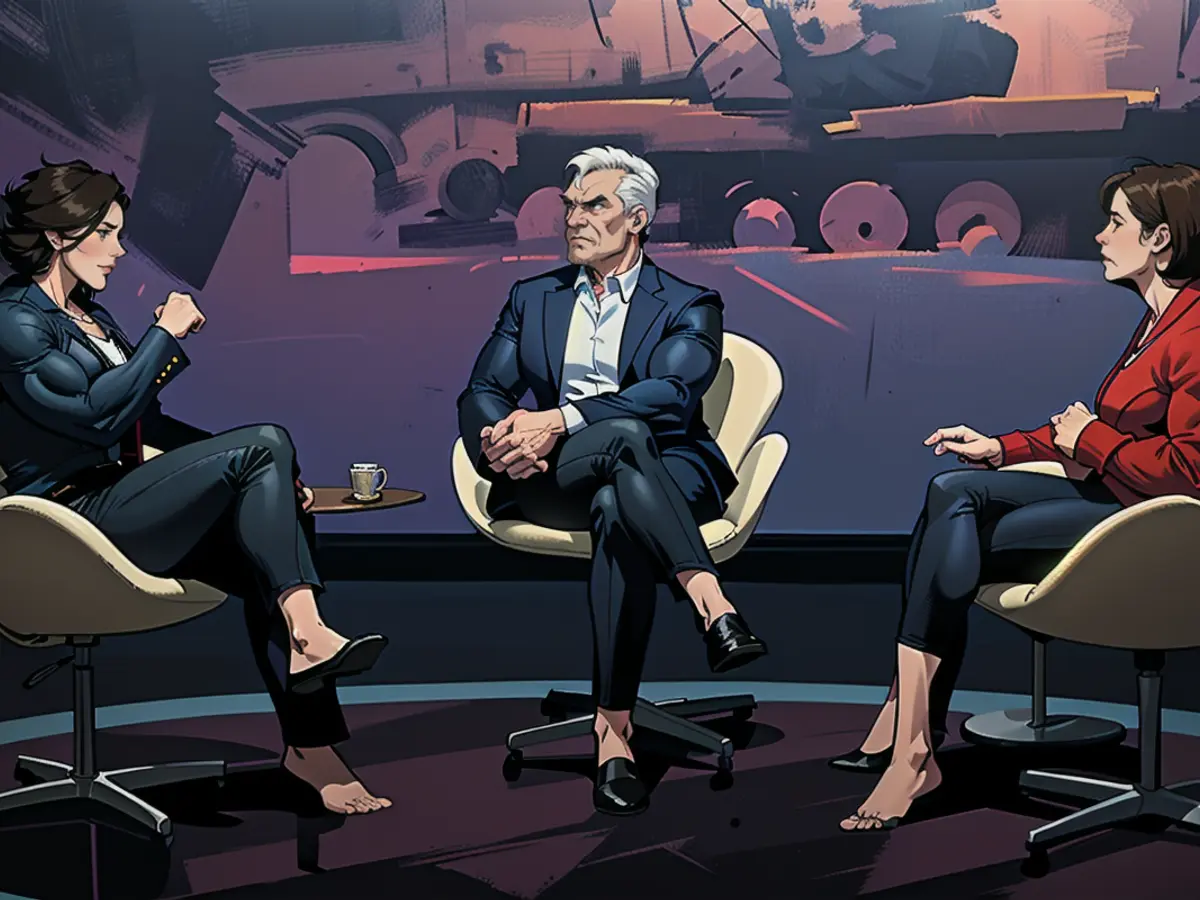The success of the war is determined by our actions.
Should Ukraine target military installations in Russia using Western-supplied weapons? Röttgen has changed his opinion on this matter, as expressed on "Maischberger." Mohamed Ali from the Left Party (BSW), on the other hand, is worried that this could give Putin's forces a boost.
During their previous encounter on "Maischberger," Röttgen and Mohamed Ali held opposing views. She was still left-leaning at the time, while he was a CDU foreign policy expert. Now, she serves as one of the co-chairs of BSW and still advocates for diplomatic efforts to resolve the conflict in Ukraine. Röttgen, too, wants the war to end quickly but doesn't believe in negotiations. On the show, he stated that Putin has consistently shown disinterest in negotiations.
Ukrainian President Zelenskyy and NATO Secretary General Stoltenberg are urging Western countries to allow Ukraine to assault Russian military targets. The question is whether such an attack would compel Putin to surrender or escalate the war. This question could have been answered by Putin himself through an interview on Russian television, where he warned: "Politicians from NATO countries, especially in Europe, particularly in smaller countries, should bear in mind what they're playing with. This is often a small state with a small territory and a high population density. And you should consider this factor before even mentioning an attack on Russian soil." This statement could imply that Putin is threatening attacks against the Baltic States. It may also explain the troop buildup Klitschko reports just north of Russia.
According to Röttgen, victory in the conflict can be achieved through military action. He discusses this with Mohamed Ali on "Maischberger." Röttgen said, "We'll only win the war if Putin fails. To do this, you need weapons, ammunition, and assistance." While the West has provided Ukraine with ammunition, they fall short in terms of providing adequate support.
All politicians, including Röttgen, have adjusted their stances lately. "It would be entirely justifiable, legal, and legitimate for Ukraine to attack military targets even on Russian soil using Western weapons, internationally speaking," he affirms. Previously, NATO's stance was that such actions couldn't be executed with Western weapons. Russia has turned this into a war strategy, positioning missile launchers directly on the border with Ukraine. Shelling from these positions now plagues Ukrainian cities. "Civilian life has become unbearable in this second-largest city in Ukraine, Kharkiv. Not only is the energy system being systematically destroyed, but also the civilian infrastructure," Röttgen added.
Mohamed Ali agrees that Ukraine is capable of attacking Russian targets internationally but considers the risks involved. "The real question is what weapons to use," she stated. If Ukraine fires on Russian territory with Western weapons, the risks of escalating the war are higher. Additionally, reports show difficulties in recruiting new soldiers for Putin's forces. Nevertheless, she proposes that the focus should be on attempts to secure a ceasefire, potentially resulting in negotiations if necessary.
Röttgen dismisses Mohamed Ali's concerns about the dangers of Russian propaganda. "Propaganda and intimidation are tools used by Putin as part of the war," he responds. Putin has also threatened the use of nuclear weapons against the West. "I'm not burning my fingers here, and we constantly have to weigh the risks and dangers," said Röttgen. "If the attacker's positions are being attacked, war against NATO after failing in Ukraine makes no military or political sense at this point. The threat of a nuclear war could only occur if Putin succeeds in Ukraine."
"The risks are, of course, enormous," Mohamed Ali responds. While she does not believe a war between Russia and NATO is militarily prudent, she recognizes that Ukraine's desperate position has persisted despite the instrument of weapons deliveries over the past two years. "It has not worked out. On the contrary, Ukraine is in a worse situation now than it was two years ago," she lamented. "Now, we must do everything to first try to achieve a ceasefire. And, if need be, we must generate the willingness for negotiations."
Read also:
- Year of climate records: extreme is the new normal
- Precautionary arrests show Islamist terror threat
- UN vote urges Israel to ceasefire
- SPD rules out budget resolution before the end of the year
- Röttgen now believes that it would be justifiable, legal, and legitimate for Ukraine to attack Russian military targets using Western-supplied weapons, a shift from NATO's previous stance.
- Despite Russia's positioning of missile launchers directly on the border with Ukraine and shelling from these positions, Mohamed Ali advocates for a focus on attempts to secure a ceasefire, potentially leading to negotiations if necessary.
- In response to Mohamed Ali's concerns about the dangers of Russian propaganda and propganda, Röttgen warns that the threat of a nuclear war could only occur if Putin succeeds in Ukraine.
- The debate on arms deliveries to Ukraine has been ongoing, with some, like Röttgen, believing that victory can be achieved through military action with weapons, ammunition, and assistance from the West, while others, like Mohamed Ali, argue for a focus on ceasefire and diplomatic efforts.
Source:








